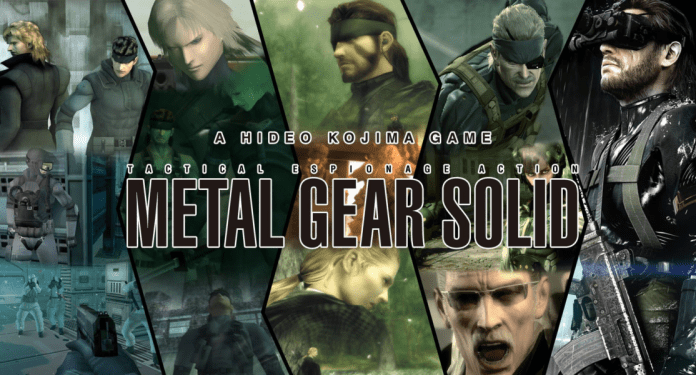The Evolution of the Metal Gear Solid Saga: 1998 to the Present
The "Metal Gear Solid" (MGS) saga, a cornerstone of the stealth-action genre, has been a defining series in the video game industry since its inception. Created by Hideo Kojima and developed by Konami, the series has grown from a single PlayStation title in 1998 to a sprawling narrative that spans multiple consoles, spin-offs, and even a possible movie adaptation. Here's a detailed look at the evolution of this iconic franchise from 1998 to today.
Metal Gear Solid (1998)
The journey began with the release of "Metal Gear Solid" on the original PlayStation. This game revolutionized the stealth genre with its innovative gameplay mechanics, cinematic storytelling, and memorable characters. Players took on the role of Solid Snake, a retired soldier tasked with infiltrating a nuclear weapons facility to neutralize the terrorist threat posed by FOXHOUND, a rogue special forces unit. The game's blend of stealth, action, and narrative depth set a new standard for video games and established Kojima as a master storyteller.
Metal Gear Solid 2: Sons of Liberty (2001)
"Metal Gear Solid 2: Sons of Liberty," released for the PlayStation 2, expanded on the original's gameplay mechanics and introduced players to a new protagonist, Raiden. The game was notable for its complex narrative, which delved into themes of information control, digital surveillance, and the nature of reality. The bold decision to shift focus from Solid Snake to Raiden was initially met with mixed reactions but has since been praised for its ambitious storytelling.
Metal Gear Solid 3: Snake Eater (2004)
Set during the Cold War, "Metal Gear Solid 3: Snake Eater" took players back in time to the origins of the series' lore. Playing as Naked Snake, the man who would become Big Boss, players navigated the dense jungles of the Soviet Union in a mission to eliminate a defector and stop a nuclear threat. The game introduced survival elements, such as hunting for food and treating injuries, and was lauded for its engaging story and deep gameplay mechanics.
Metal Gear Solid 4: Guns of the Patriots (2008)
The PlayStation 3 saw the release of "Metal Gear Solid 4: Guns of the Patriots," which concluded the saga of Solid Snake. This installment featured advanced graphics, complex storytelling, and a mix of familiar and new gameplay mechanics. Set in a world where private military companies wield unprecedented power, the game explored themes of war economy and identity. It provided closure to many long-running plotlines, cementing its place as a pivotal entry in the series.
Metal Gear Solid: Peace Walker (2010)
"Metal Gear Solid: Peace Walker," released for the PlayStation Portable, continued the story of Naked Snake/Big Boss. Set in Costa Rica during the 1970s, the game focused on building and managing a private army while uncovering a conspiracy involving nuclear weapons. It introduced co-operative multiplayer gameplay and was praised for its depth and innovation, despite being on a handheld platform.
Metal Gear Solid V: The Phantom Pain (2015)
The most recent major installment, "Metal Gear Solid V: The Phantom Pain," was released for PlayStation 4, Xbox One, and PC. It featured an open-world design, allowing players unprecedented freedom in how they approached missions. Set in the 1980s, the game followed Big Boss as he sought revenge against those who wronged him, ultimately leading to the events that would shape the series' lore. The game was celebrated for its gameplay innovations but also noted for its controversial and abrupt ending, attributed to internal conflicts between Kojima and Konami.
Spin-offs and Other Media
In addition to the mainline games, the MGS series has seen several spin-offs and adaptations. Titles like "Metal Gear Rising: Revengeance" (2013) focused on action rather than stealth, featuring Raiden as the protagonist. The series also ventured into other media, with graphic novels, novelizations, and rumors of a movie adaptation directed by Jordan Vogt-Roberts.
The Legacy and Future of Metal Gear Solid
The departure of Hideo Kojima from Konami in 2015 marked a significant turning point for the series. "Metal Gear Survive" (2018), the first game developed without Kojima's involvement, was met with mixed reviews and failed to capture the essence of the original series. Despite this, the legacy of Metal Gear Solid remains strong, with a dedicated fanbase and ongoing discussions about potential remakes, remasters, and new entries in the series.
From its groundbreaking debut in 1998 to its current status as a beloved and influential franchise, Metal Gear Solid has left an indelible mark on the video game industry. Its blend of innovative gameplay, complex narratives, and thought-provoking themes continues to inspire and captivate players around the world.

